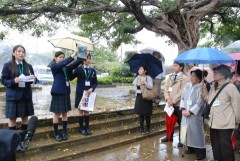High school students guide explaining Japanese schoolgirls who worked for the Imperial Japanese Army during Battle of Okinawa

The students explained the war experiences of the Shiraume-tai in front of the survivors, Ho Takemura (far left) and Kiku Nakamura (second from right) at the site of the Okinawa Prefectural Daini High School site in Naha on February 2.
February 3, 2014 Ryukyu Shimpo
On February 2, Okinawa Shogaku High School held a bus tour to retrace the route taken by the Shiraume-tai, a group of Japanese schoolgirls assigned by the Imperial Japanese Army to serve as nurse-aides during the Battle of Okinawa. The students acted as guides.
This year is the 10th year that the students and survivors of the Shiraume-tai have been deepening exchanges.
Listening to the explanation from the students, one of the survivors said, “We can depend on them. I want the students to continue telling the story of our war experiences, and contribute to peace.”
About 50 students and the survivors took part in the tour.
They toured around six sites such as Okinawa Prefectural Daini High School in Naha, the field hospital shelter in Yaese and the Tower of Shiraume in Itoman.
Eighteen first graders took over what their seniors did and acted as guides for the first time.
Soshi Nobu explained that schoolgirls provided round-the-clock care to wounded soldiers in the shelter. He asked, “If you were in the same position, could you endure that hellish work?”
Karin Furiwara, who watched what their juniors did, said, “Although I was worried about them because they read things in a monotone voice, they did their best today. We are the last generation that can hear the war experience stories told by the survivors. I would like to listen closely to what they say while they are alive, and tell their story to the next generation.”
Eighty-five-year-old Ho Takemura, one of the survivors, said, “I feel confident about the students because they have been acting as guides for 10 years. We get older and always feel the need to tell our experiences to the future generations. I would like the students to tell the story to the people around them one by one and contribute to peace.”
Eighty-five-year-old Kiku Nakamura, the head of the survivors’ association said, “I feel confident about what the students are doing because they try to tell our story to other people rather than just listen. Their 10 year-experience makes them well-informed.”
(English translation by T&CT)
Previous Article:Higa publishes conversation book written in Shimakutuba and English
Next Article:Yaeyama, Miyako fishermen complain about new rules between Japan and Taiwan
[Similar Articles]
- “Try to imagine”–Okinawa Shogaku students teach Hiroshima high school students about the Battle of Okinawa, show them the footsteps of the Shiraume students
- Himeyuri screened in Germany: 180 people view the documentary in Japanese school
- Himeyuri Peace Museum friends and supporters celebrate 30 years since the museum’s opening, express hopes for the next generation
- Okinawan Junior High School students learn about the Constitution of Japan in Uchinaguchi
- Youth from Okinawa, Hiroshima and Nagasaki share thoughts on peace
 Webcam(Kokusai Street)
Webcam(Kokusai Street)


